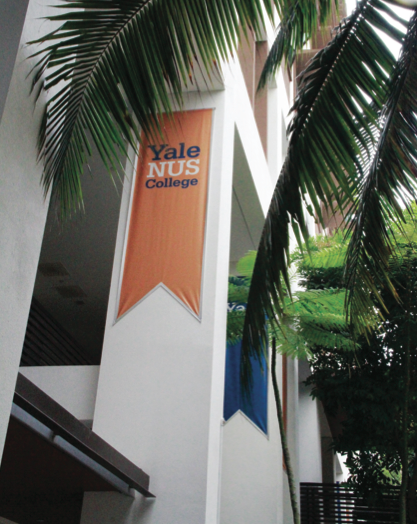
At Yale’s venture in Singapore, gender-neutral housing is known as “open housing,” gender-neutral bathrooms as “single-stall bathrooms” and Sex Week as “Doing it Right.”
The fledgling liberal arts institution’s naming decisions are, for some, an attempt to avoid appearing “too American.” But others have suggested that the university made these naming selections due to the diversity of the student body.
In a November opinion article published in the Yale-NUS student newspaper The Octant, Daryl Yang YNUS ’18 addressed — through the lens of naming issues — the nuances of balancing a liberal arts education and a conservative Singaporean society. The reason for these decisions is to avoid appearing overly American and therefore “antagonizing” a public drenched in conservative values, Yang wrote.
“With [how Yale-NUS names] Sex Week and gender-neutral housing, it really was about not being able to call a spade a spade for fear of public backlash,” Yang told the News.
Yang’s meetings with the Yale-NUS administration left him with the impression that the school opted for “open housing” instead of “gender-neutral housing” because administrators did not want the policy to be seen as an import of the American value of trans-inclusion, he said. A former president of The G Spot, a student organization at Yale-NUS tackling issues concerning sexuality, gender and feminism, Yang said this is his personal view and not a representation of the group opinion.
He added that the school — which is the only higher-education institution in Singapore that offers the option of gender-neutral housing — described the housing policy as males and females sharing a suite, as opposed to using terms of creating a more inclusive space for genderqueer and transgender students.
Yale-NUS professor Brian McAdoo, who served as the interim dean of students when the school introduced gender-neutral housing policy and held “Doing it Right,” did not mention the conservative Singaporean context as a reason for the school’s naming choices. Instead, he said that the diversity of the student body led the administration to choose those monikers.
Students have different levels of education and comfort with topics such as sex and sexuality, McAdoo said. To engage the Yale-NUS community in those conversations and serve the educational value of introducing these topics, the school has to be more sensitive in phrasing things that “might be unfamiliar” to students, he said.
McAdoo added that terms such as “gender-neutral” are more prevalent in the U.S., but are not as common in Asia. To make the concept of gender-neutral housing more relatable and understandable, the school began to use the more familiar phrasing of “open housing,” he said.
Still, Yale-NUS students interviewed said they use the term “gender-neutral housing” with each other, as does Singapore’s largest newspaper, The Straits Times. The Yale-NUS student government survey administered to gauge interest in campus housing-policy changes also used the term “gender-neutral housing.”
Yang said not being able to call certain aspects of life on campus “what they are” is a missed opportunity to raise awareness about campus issues. He added that The G Spot initially planned to call the college’s version of “Sex Week” by that name, but that the Dean of Students Office suggested changing the name out of concern for negative reactions and possible alienation of some members of the Yale-NUS community.
Some American colleges, such as Columbia and the University of Chicago, also opted for the term “open housing,” rather than “gender-neutral housing” several years ago.
Wan Ping Chua YNUS ’17 said she felt the different terms — open versus gender-neutral housing — meant the same thing to her and therefore did not pose any problem. While “Sex Week” might make the event’s goal clearer, “Doing it Right” also has sexual connotations and is “not that much” different, she said.
Yale-NUS introduced open housing for non-first years last April.







